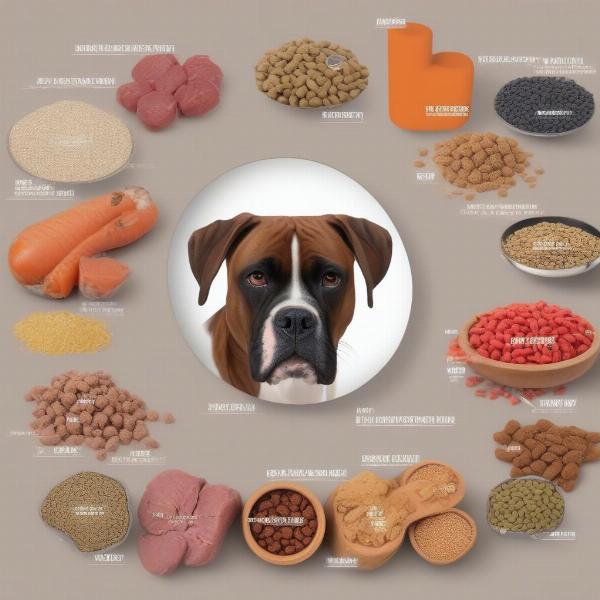Choosing the right food for your Boxer is crucial for their overall health and well-being. While there isn’t a single “worst” dog food brand, certain ingredients and types of food should be avoided to prevent potential health issues in this breed, which is prone to specific sensitivities. Understanding what constitutes poor quality dog food and recognizing its potential impact on your Boxer’s health will empower you to make informed decisions.
Decoding Dog Food Labels: Identifying Red Flags for Boxers
When browsing dog food aisles, it’s easy to get overwhelmed by the sheer variety of options. However, a discerning eye and a basic understanding of dog food labels can help you identify potential problems. Look out for generic meat sources like “meat by-products” or “animal meal,” which can indicate low-quality ingredients. “Meat” without specifying the animal source is another red flag. Boxers often thrive on specific protein sources, so knowing exactly what you’re feeding them is important. Fillers like corn, wheat, and soy can be difficult for Boxers to digest and offer minimal nutritional value. Artificial colors, flavors, and preservatives are also best avoided.
Common Health Issues Linked to Poor Diet in Boxers
Feeding your Boxer a subpar diet can contribute to various health problems. Boxers are prone to allergies, and poor-quality ingredients can exacerbate skin issues and digestive upset. Additionally, a lack of essential nutrients can lead to weakened immunity, making them more susceptible to infections. Obesity is another concern, particularly with foods high in fillers and low in protein. Hip and elbow dysplasia, common in larger breeds like Boxers, can be worsened by excessive weight gain. Heart conditions, also prevalent in Boxers, can be influenced by a diet lacking in taurine and other essential nutrients.
Specific Ingredients to Avoid in Boxer Dog Food
Certain ingredients are particularly problematic for Boxers. Artificial sweeteners like xylitol are highly toxic to dogs and should be avoided entirely. Rawhide, while a popular chew treat, can pose a choking hazard and offer little nutritional benefit. Foods high in fat can trigger pancreatitis, a serious and potentially life-threatening condition in Boxers. Lastly, be mindful of the sodium content in dog food, as excessive sodium can contribute to heart problems.
Choosing the Best Food for Your Boxer: A Guide to Healthy Options
Opt for dog foods with clearly identified meat sources as the primary ingredient, such as chicken, beef, lamb, or fish. Look for whole grains like brown rice or oatmeal instead of fillers. Fruits and vegetables provide essential vitamins and antioxidants. Consider a breed-specific formula designed to meet the nutritional needs of Boxers. Consult with your veterinarian for personalized recommendations based on your Boxer’s age, activity level, and any existing health conditions.
 Best Dog Food Choices for Boxers
Best Dog Food Choices for Boxers
Conclusion: Prioritizing Your Boxer’s Health Through Proper Nutrition
Choosing the right food is an investment in your Boxer’s long-term health and happiness. By avoiding low-quality ingredients and focusing on a balanced, nutritious diet, you can help your Boxer thrive and enjoy a long, active life. Remember to consult with your veterinarian for personalized guidance, and always monitor your Boxer for any signs of food sensitivities or health issues.
FAQ:
- What are some signs of food allergies in Boxers? Itchy skin, digestive upset, ear infections, and excessive licking are common signs.
- Can I feed my Boxer a raw food diet? Raw diets can be risky and require careful planning and preparation to avoid nutritional deficiencies and bacterial contamination. Consult with your vet before switching to a raw diet.
- How much should I feed my Boxer? Feeding guidelines vary based on age, weight, and activity level. Check the dog food packaging and consult your vet for specific recommendations.
- What if my Boxer refuses to eat their new food? Introduce new food gradually, mixing it with their old food. If they continue to refuse, consult with your vet to rule out any underlying health issues.
- Are grain-free diets good for Boxers? While some Boxers may benefit from a grain-free diet, there is ongoing research regarding potential links between grain-free diets and heart conditions in dogs. Consult your vet before making a switch.